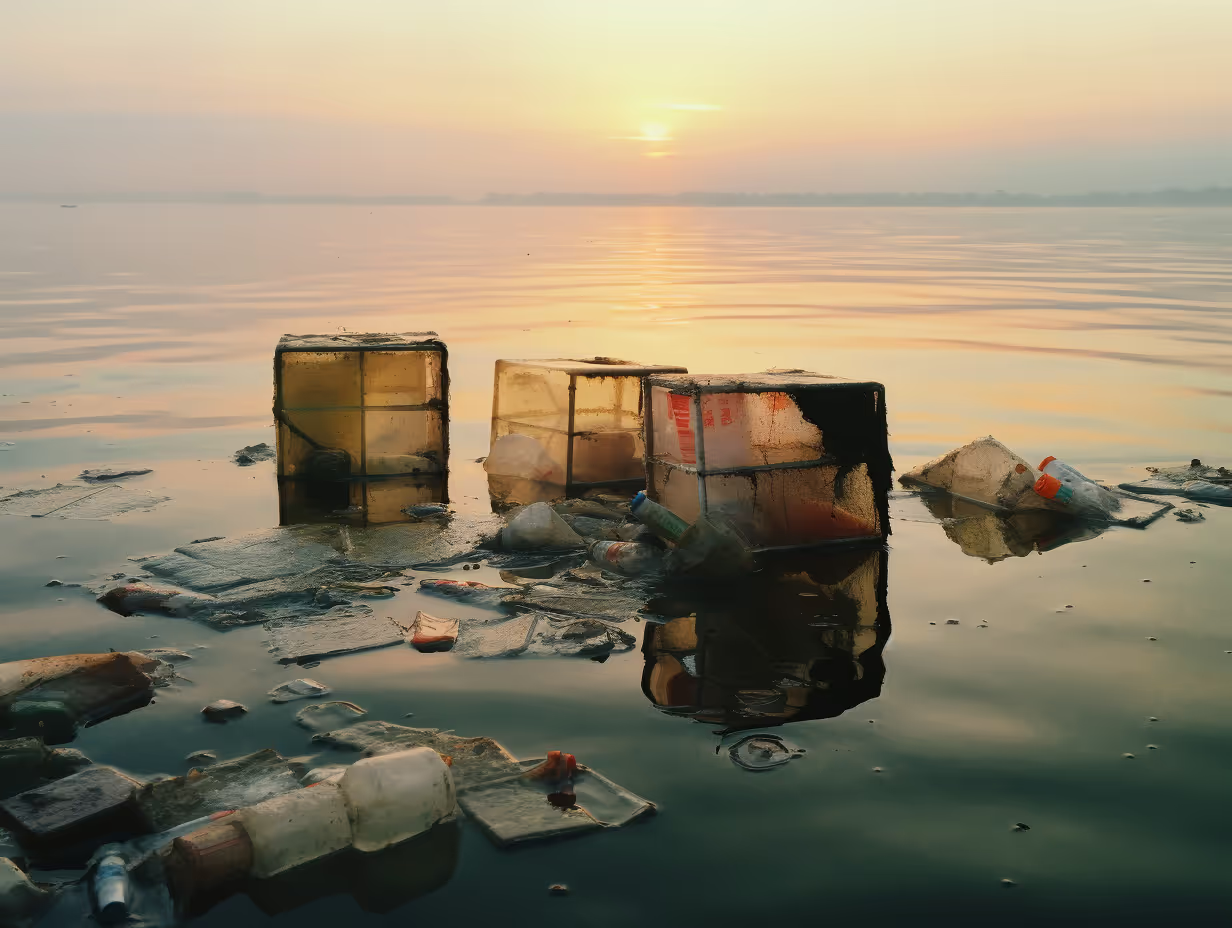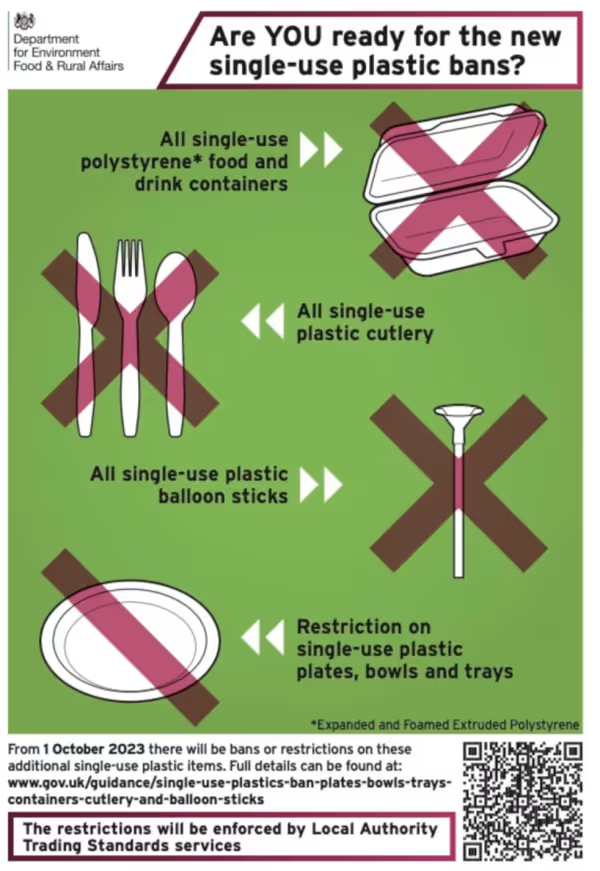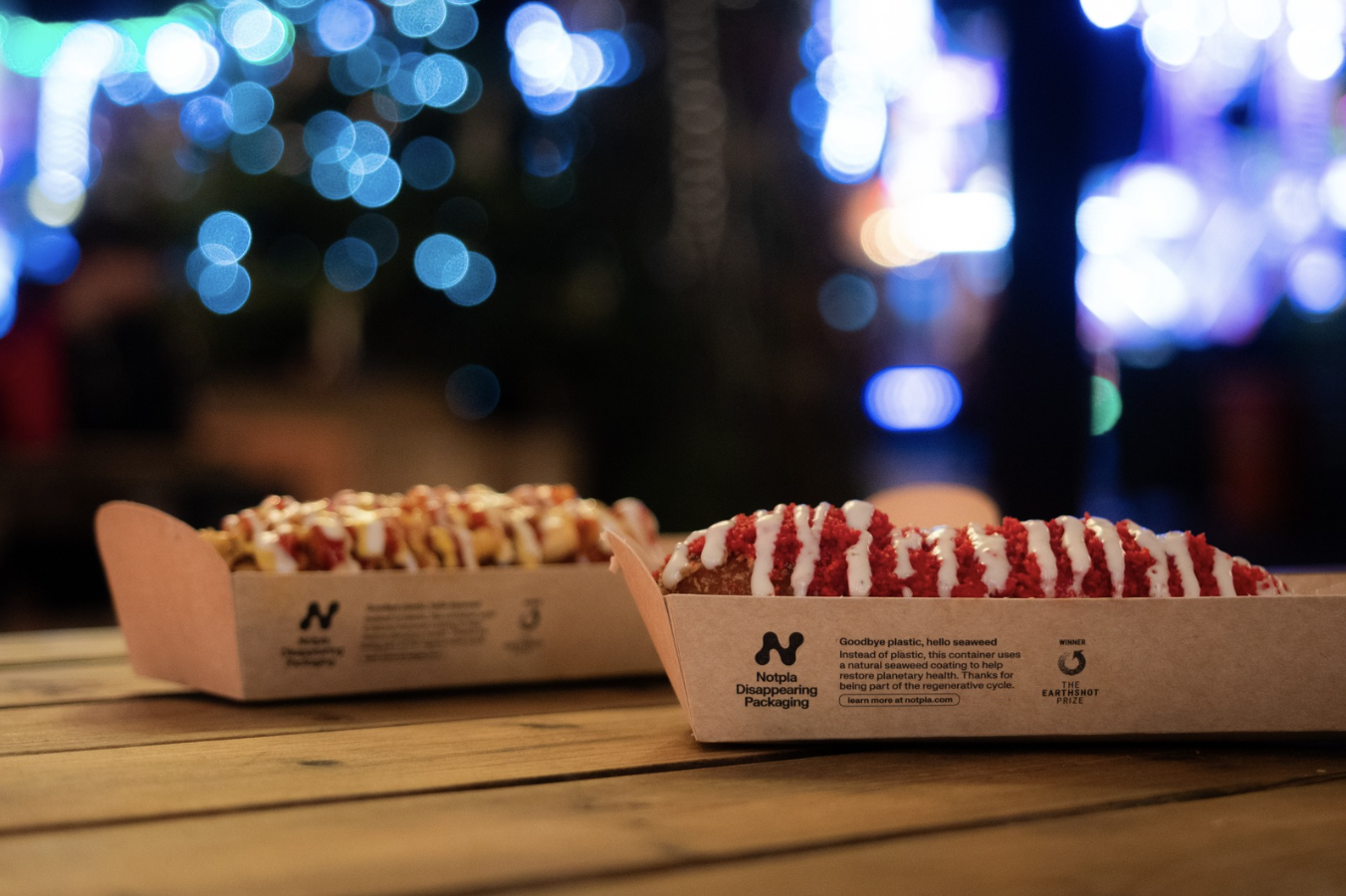
The Single-Use Plastic Ban in England, entering into force on the 1st of October 2023, prohibits single-use plastic items that are commonly littered and difficult to recycle.
The ban covers plastic straws, stirrers, plastic plates, cutlery, and polystyrene food and drink containers. These single-use plastics must be replaced with more sustainable alternatives made of materials like paper or wood, or from generative material like Notpla. However, under an exemption to the new rules, takeaways will still be able to use plastic containers, trays and wrap. You will find on your right the government guide showcasing the items that are being banned, shared by the Department for Environment & Rural Affairs (DEFRA). From the 1st of October, retailers and food/drink vendors can face fines if they continue to provide customers with the banned single-use plastic items. Businesses need to switch to other alternatives that do not contain petroleum-based plastics or bioplastic made from plants.

The ban covers plastic straws, stirrers, plastic plates, cutlery, and polystyrene food and drink containers.
These single-use plastics must be replaced with more sustainable alternatives made of materials like paper or wood, or from generative material like Notpla.
However, under an exemption to the new rules, takeaways will still be able to use plastic containers, trays and wrap.
You will find on your right the government guide showcasing the items that are being banned, shared by the Department for Environment & Rural Affairs (DEFRA)
From the 1st of October, retailers and food/drink vendors can face fines if they continue to provide customers with the banned single-use plastic items. Businesses need to switch to other alternatives that do not contain petroleum-based plastics or bioplastic made from plants.
The Single-Use Plastic Ban is a fantastic opportunity, first and foremost, in making meaningful strides towards restoring the health of our planet. The statistics are pretty harrowing: by 2050 our oceans could contain more plastic than fish (by weight), and right now, we may be ingesting 5 grams of plastic a week – the equivalent of a credit card – through common foods and drinks.
While this ban is a step in the right direction, we believe food service businesses should go further by reassessing the validity of their plastic-free claims and better addressing the end-of-life of their packaging: are you sure the packaging you are eating with does not contain any PFAs, or isn’t actually lined with aqueous-coating, a coating that still contains micro-plastics?
It is time to look into the future and switch to regenerative packaging solutions that offer credible alternatives to plastic while reducing business’s impact on the planet… And guess what? These solutions could even be more sustainable than recycling or reuse, which can sometimes generate more plastic!
We had a chat with Hoa, Head of Impact & Sustainability here at Notpla to create some clarity and hear how the most future-focussed businesses will be taking the opportunity to go further for the planet and their consumers, not just tick the box.
While some of the existing alternatives still contain plastics, Notpla takeaway boxes, coated with seaweed, provide a true sustainable solution. Replacing single-use plastic in a waste-free manner, they are leaving no plastics nor chemicals behind.
As part of the EU Single-Use Plastics Directive (SUPD, which entered into force in July 2021), the EU revealed the first definition of plastic: “plastic” means a material consisting of polymers that are either chemically modified or synthetically polymerised.
After a thorough independent assessment by global sustainability consultancy, Eunomia Research & Consulting, Notpla Coating was confirmed as fully compliant with the EU SUPD, and therefore is not plastic. It is classified as a natural polymer and has been shown not to have been chemically modified. Further positive assessment was received from the Dutch government – the nation which is currently taking the strictest stance on enforcing the SUPD of any EU member state by imposing a tax on disposable cups and containers that contain plastic.
This way, Notpla’s seaweed-based packaging offers the assurance of SUPD compliance, proving its exemption from upcoming bans and taxes on disposable plastic food packaging across Europe.
So whether you are a customer with burning questions on our takeaway boxes or a business owner keen on discussing how you could switch to Notpla to minimise your impact on the planet and be compliant with the new regulation, don’t hesitate to contact us!

%20(1).avif) From student idea to sustainable solution: Earthshot Prize-winner Notpla returns to Imperial College London
From student idea to sustainable solution: Earthshot Prize-winner Notpla returns to Imperial College London How Peppermint and Notpla redefined sustainability at Winter Wonderland
How Peppermint and Notpla redefined sustainability at Winter Wonderland.avif) Wembley Stadium partners with Notpla and Delaware North to advance sustainable packaging in live music
Wembley Stadium partners with Notpla and Delaware North to advance sustainable packaging in live music